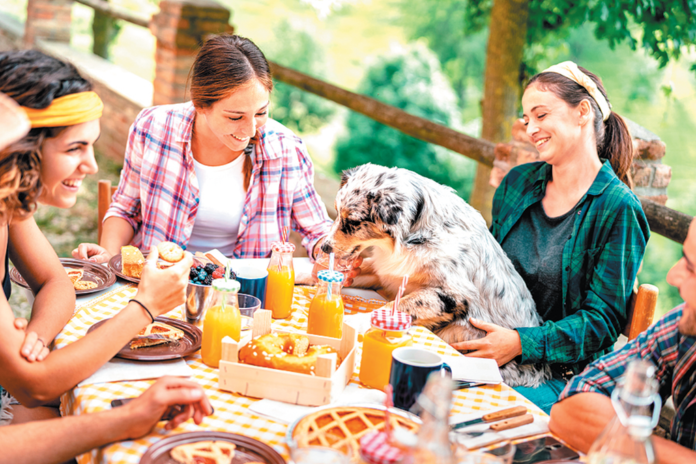“There’s a lot of mythology out there about not exposing puppies to the outside world until they’ve had all their vaccines,” says Tufts veterinary behaviorist Stephanie Borns-Weil, DVM. “But that can take many months. And a puppy’s socialization window largely ends when she is just 14 to 16 weeks old.”
It’s for that reason that Dr. Borns-Weil and other animal behaviorists recommend that puppies be brought into contact with different people even before they have been fully vaccinated.
“Providing optimal socialization experiences for your dog during the socialization window will really help her be comfortable with people later,” she says. After that period of rapid brain growth, a dog’s ability to feel comfortable around people becomes less flexible.
“I don’t recommend taking a young puppy who has not yet had all her vaccination shots to a dog park where any dog that is not inoculated can show up,” she says. But in a controlled setting with vaccinated dogs, risks for illness are low. In fact, the doctor comments, “research shows that it’s riskier not to expose your puppy than to expose her in a controlled way. She’s more likely to get surrendered to a shelter for being unable to get along with people if she’s not socialized than to contract a communicable disease if put in proximity with others.”
Responding to the dog’s inborn temperament
Puppies come with various temperaments — inclinations they are born with and that can be worked with before their personalities fully form. Some tend to be scared; others start out more bold.
“For puppies on the bolder end, just having positive interactions — some petting and some play — reinforces the idea that people are good to be around and mean them no harm,” Dr. Borns-Weil says. For the shy puppy, there may be more oversight necessary. “You want to make sure your puppy doesn’t get overwhelmed,” the doctor says. If she is backing up in the presence of people or doesn’t want to come forward — or is dropping to the floor exposing her belly or urinating submissively — she is not having a good time. That is, such behavior is not cute. It’s a sign of fear and stress.
What a dog’s guardian should not do in response to such behavior is decide, “That’s okay. She’ll get over it.” Repeatedly exposing a puppy to people without any intervention when she is exhibiting fear and timidity will only reinforce the negative association. Behaviorists call it flooding. Instead, you have to expose her to people gradually, starting with gentle souls who don’t come on strong and who speak softly — and who have treats to throw at the dog’s feet without getting too close. Things can progress from there.
No matter what the puppy’s temperament
Whether your young puppy is a shrinking violet or game for interaction, it’s important that she sees and has positive experiences with as many different kinds of people as possible — people putting up umbrellas, people in wheelchairs, people in hats, tall people, short people. “You’re never going to be able to expose a puppy to every single kind of person she’s going to come across in her life,” Dr. Borns-Weil says. “But if a dog has seen a whole bunch of people,” the doctor notes, “she will understand that people come in all different shapes and sizes and with all different kinds of details. She doesn’t have to see every single possibility because she will learn to generalize that people are okay.”
In the best of all possible worlds, young puppies who have just been adopted should be taken to puppy parties run by trainers or veterinarians. With four or five carefully chosen people in the room who might hold or pet the dog while other puppies are present, the professional will be able to identify behavior that gives clues to what the dog needs for successful socialization. If one puppy yips and hides under a chair while the others are playing raucously, it will be clear that the scared puppy has to be protected and perhaps should interact with only the gentlest person present, or maybe with just her new pet parent. In extreme cases, the puppy may need help from a veterinary behaviorist.
Of course, with the pandemic, the opportunity for structured puppy parties has temporarily gone by the boards. “It’s a concern,” Dr. Borns-Weil says, especially since so many people have adopted puppies in the last year. That said, not fully socializing a puppy by the time she is 14 or 16 weeks old doesn’t mean she can never learn to feel comfortable around people. It just means she may not get used to different people via sheer exposure. She may need some behavior modification that includes scheduled interactions with trusted people who will not come on too strong. She can then parlay those positive experiences to interactions with others.





